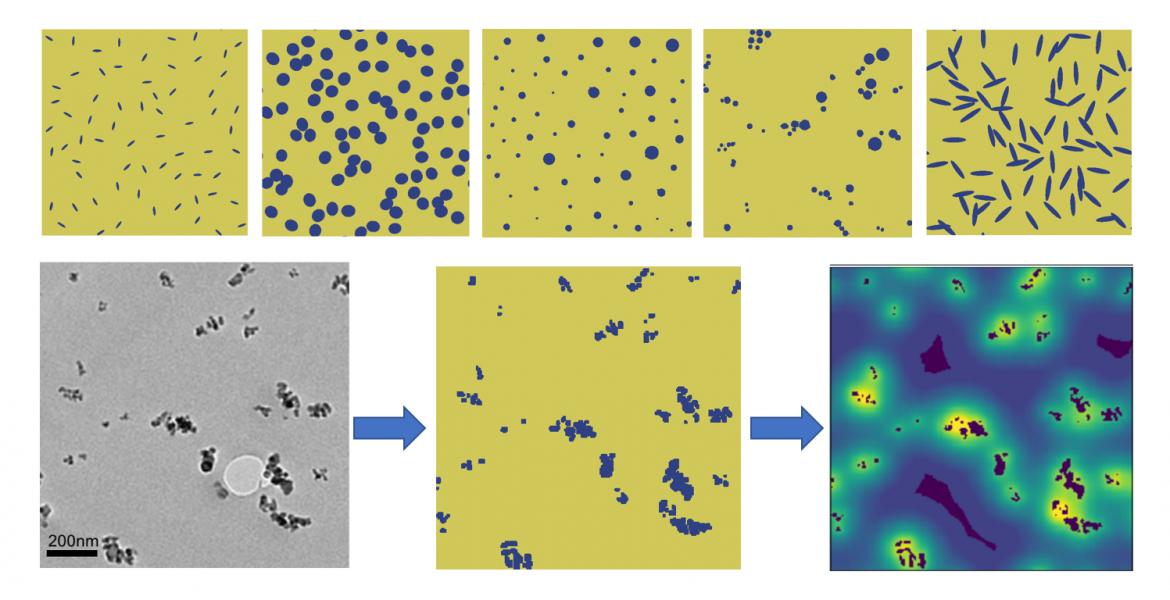The aiM program supports an array of integrated materials science and machine learning research carried out by faculty, staff, and graduate students. Crossing disciplinary boundaries, these projects investigate the mechanistic underpinnings for materials response, model potential material design space, and optimize solutions to achieve novel combinations of properties.
Faculty Research Teams
L. Catherine “Cate” Brinson
The Brinson lab’s research objective is to characterize and model advanced materials systems, bridging across scales, to develop new understanding of material mechanisms and transfer knowledge into FAIR datasets towards novel material design. The research activities include nanoscale experimental investigations, especially using AFM methodologies, computational predictions of material behavior using finite element analysis and micro mechanics approaches, and application of AI methods including surrogate modeling, optimization, and natural language processing. Target material systems include multiphase polymer systems, nancomposites, bioplastics, metamaterials and 3d printing materials.
aiM Trainees: Nicholas Finan, Defne Çirci, Io Saito, Han Zhang, Anlan Chen

Cynthia Rudin
Cynthia Rudin’s research focuses on machine learning tools that assist humans in making better decisions, with an emphasis on interpretable machine learning and its applications. Her work includes decision trees, sparse linear models and scoring systems, variable importance measures, causal inference methods, interpretable deep learning, dimension reduction, and techniques that integrate domain-based constraints and other types of domain knowledge into machine learning. These methods are applied to critical societal challenges in healthcare, criminal justice, and energy grid reliability, as well as in materials science and computer vision. Many of the interpretable machine learning algorithms developed in her research heavily rely on efficient discrete optimization techniques.
aiM Trainees: Zhi Chen, Chudi Zhong, Yingfan Wang, Yiyang Sun
Johann Guilleminot
Dr. Guilleminot’s research focuses on uncertainty quantification, computational mechanics and materials science, as well as on topics at the interface between these fields. He is particularly interested in the multiscale analysis of linear/nonlinear heterogeneous materials (including biological and engineered ones), homogenization theory, scientific machine learning, statistical inverse problems and stochastic modeling with applications for computational science and engineering.
aiM Trainees: Peiyi Chen, Hao Zhang, Ariana Quek, Alexander Bonacci, Jin Yi Yong
Gaurav Arya
Gaurav Arya’s research laboratory employs physics-based computational tools to gain a fundamental, molecular-level understanding of various biological and soft-material systems, with the goal of discovering new phenomena and developing innovative technologies. The lab’s methods are primarily based on statistical mechanics, molecular modeling and simulations, stochastic dynamics, coarse-graining, bioinformatics, machine learning, and polymer/colloidal physics. Currently, the research focuses on four main themes: genome organization and regulation, polymer-nanoparticle composites, viral DNA packaging, and DNA nanotechnology.
aiM Trainees: Po-An Lin, Safak Callioglu, Daniel Duke, Juanita Pombo
Jianfeng Lu
Jianfeng Lu is an applied mathematician interested in mathematical analysis and algorithm development for problems from computational physics, theoretical chemistry, materials science, machine learning, and other related fields.More specifically, his current research focuses include: High dimensional PDEs; generative models and sampling methods; control and reinforcement learning; electronic structure and many body problems; quantum molecular dynamics; multiscale modeling and analysis.
aiM Trainees: Yixin Tan
Jie Liu
Dr. Liu’s research interests are focusing on the chemistry and material science of nanoscale materials. Specific topics in his current research program include: Self-assembly of nanostructures; Preparation and chemical functionalization of single walled carbon nanotubes; Developing carbon nanotube based chemical and biological sensors; SPM based fabrication and modification of functional nanostructures.
aiM Trainees: Vasishta Somayaji
Stefano Curtarolo
Professor Stefano Curtarolo is a leader in computational materials science, renowned for his high-throughput methodologies that enable rapid discovery and design of new materials. His research integrates data science techniques with classical materials science, creating a powerful framework for predicting material properties and uncovering novel compounds. Curtarolo’s work has significantly accelerated the pace of innovation in materials informatics, supporting the development of materials with tailored functionalities for a variety of applications.
David Banks
Professor David Banks is a distinguished statistician whose work sits at the intersection of theory and application. His research involves developing robust statistical methodologies that address the challenges of analyzing complex datasets across various scientific domains. By integrating advanced statistical theory with data science practices, Banks contributes critical insights that support data-driven discovery and innovation in numerous fields.